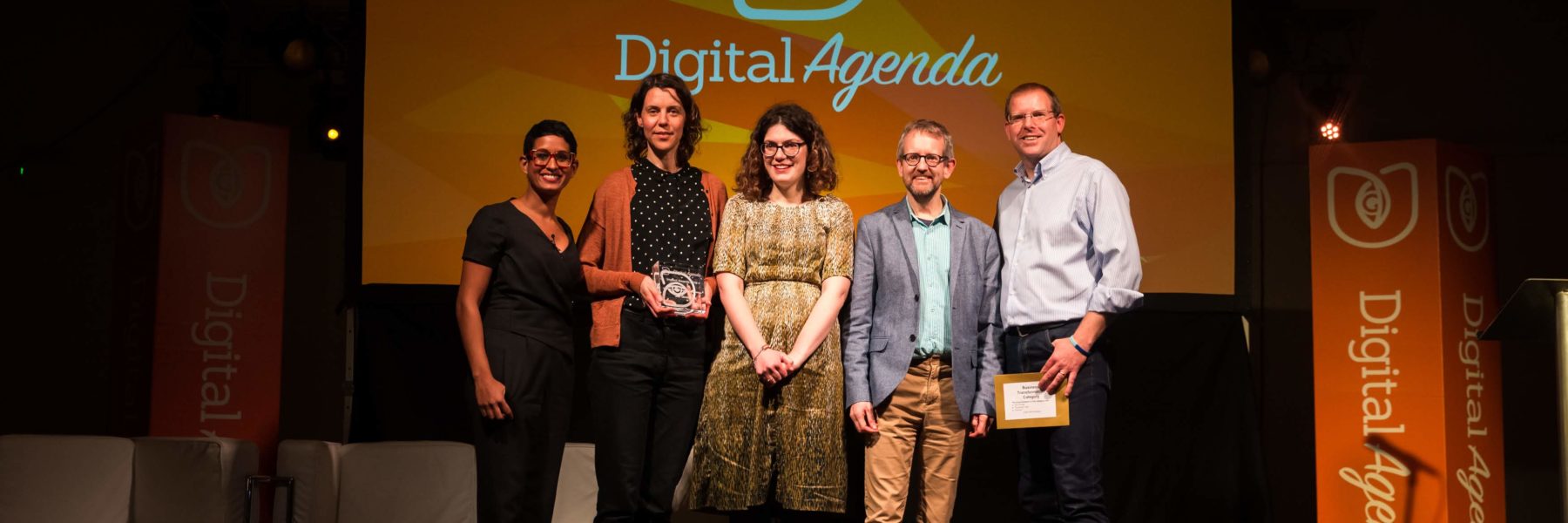 News
News


In March 2019, we were delighted to win a Digital Impact award for our work on opening up grants data, with the jury noting that we’re providing “a new digital solution to a well established problem in a notoriously difficult sector”.
We were included in the Business Transformation category, and while some people might find it strange to think of philanthropy as a business, it’s one that’s worth over £3 billion each year and is supporting vital work across the UK.
A key difference between philanthropic organisations and a traditional business is that they’re not driven by financial profit, so when demand outstrips supply, the answer is rarely going to be “let’s expand”. This is what led philanthropist Fran Perrin to set up 360Giving, as she was acutely aware that she needed to take strategic decisions about what to support but she couldn’t see who else was funding the initiatives she was interested in. She felt she was “giving in the dark” and wondered if the sector could be more data-informed.
Inspired by initiatives such as Citymapper, which uses real-time transport data shared openly by cities across the world, Fran wanted to test if something similar could be developed for UK grantmaking. Was there a way to bring funding information together so that anyone could quickly see what’s being funded in a particular community or sector?
To find out, we brought together some like-minded funders and technical experts to develop a standard format for sharing grants data – and 360Giving was born. We set to work looking at the basic information people want to know about grants – who to, what for, how much, when, etc. We found that nearly all funders collect this information and it would be fairly simple to create a standard way of sharing it so everyone could benefit.
After a bit of testing, the 360Giving data standard became a reality with some leading funders taking the plunge by sharing their data.
At first there was a bit of nervousness but there have been no scandals. Most of the information was already available on funders’ websites and in their annual reports. The difference is that it’s now much easier to find and compare.In fact, funders tell us they’ve found sharing their grants data has made them think more broadly about what information they collect and how they use it. What questions does it help answer? How can they explain more clearly what they do and don’t fund and why?
There are now 100 funders sharing over £26 billion worth of grants openly. These range from charitable trusts and family foundations, corporate funders, local authorities and central government departments. All the data can be compared, visualised and downloaded by anyone who wants to better understand how civil society is funded. This saves days of wasted time trawling countless websites and documents trying to find out who is funding what.
Never before has this information been available so easily and for free. It’s a quiet revolution, and it’s opening up a goldmine of information that will benefit civil society.
360Giving has come a long way over the past three years. We’ve learned that:
1. Funders are generally low-tech, but recognise the benefits of sharing their data
In a climate of local authority cuts, increased scrutiny of charities and the desire to champion philanthropic giving, funders were quick to see the benefits of sharing their data and worked with us. Most need a little help preparing it but they are keen to learn.
2. It’s a bit scary the first time
Funders are sometimes nervous the first time they share their data openly. What if people misunderstand their funding model or they are inundated by applications? But this hasn’t happened. Instead, funders tell us the process of opening up their data has led them to look more closely at what information they are collecting, where and how they share it and what other data can support their work. They’ve also seen how the data can support research.
3. Most people want deeper stories and evidence, not raw data
Most people don’t know how to work with raw data; but they’re interested in the stories and evidence hidden within it. This is why we have developed online platforms such as GrantNav, Beehive Giving and 360Insights, to help non-techies use the information too.
4. The importance of testing and working in partnership
To make sure we were getting honest feedback on what is and isn’t working and we’re not just serving one community’s needs, the team works with a variety of data users. Fundraisers, researchers, policy makers and journalists want this information too; for example, to look at funding to deprived areas or to better understand different communities or funding to a specific issue.
In an ideal world, all grants data would be shared openly, be it from government bodies, trusts and foundations, corporate funders, or even individual donations made online. This would allow anyone to follow the flows of money going to civil society, and better identify needs, gaps and overlaps. It would also help answer some of the trickier questions such as the impact of cuts to local authority grants and what issues or areas are the most or least funded.
Whilst no perfect world of data exists, grantmaking organisations are encouraged to start sharing the data they have and to build from there. They’ve got nothing to lose, and civil society has everything to gain.
If you want to find out more about our work and the digital tools we’re building, then sign up to our monthly newsletter.